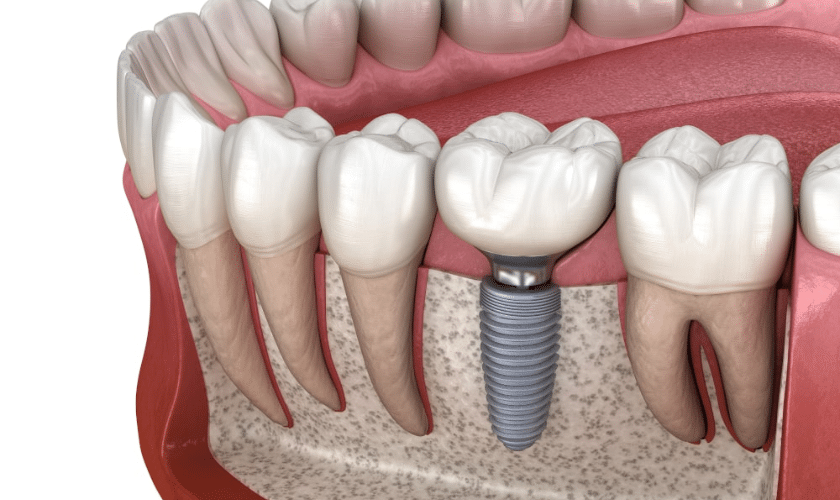
In today’s world, maintaining a healthy and radiant smile is a key component of overall well-being. Missing teeth can not only affect your appearance but also lead to various dental issues. Dental implants have revolutionized the field of dentistry, offering a permanent solution that looks, feels, and functions like natural teeth. Whether you’ve lost a tooth due to injury, decay, or other reasons, dental implants might be the perfect solution for you.
Imagine smiling with confidence, eating your favorite foods without discomfort, and speaking clearly without hesitation. Dental implants can make this a reality. They are more than just a cosmetic fix—they offer substantial health benefits and can significantly improve the quality of life for those with missing teeth. This guide will take you through everything you need to know about dental implants, from understanding what they are to the benefits they offer and what you can expect during and after the procedure.
What Are Dental Implants?
Dental implants are artificial tooth roots made of biocompatible materials like titanium. They are surgically placed into the jawbone to support replacement teeth, bridges, or dentures. Unlike traditional dentures or bridges, dental implants are a permanent solution that integrates with the jawbone, providing stability and support similar to natural tooth roots.
The Benefits of Dental Implants
1. Natural Look and Feel
One of the most significant advantages of dental implants is their ability to mimic the appearance and function of natural teeth. The crown, or the visible part of the implant, is custom-made to match your natural teeth in color, shape, and size, ensuring a seamless blend with your smile.
2. Improved Oral Health
Dental implants help preserve the jawbone and prevent bone loss that typically occurs when a tooth is missing. This is because the implant stimulates the jawbone, similar to natural tooth roots, promoting bone growth and preventing deterioration. Additionally, implants do not require the alteration of adjacent teeth, unlike bridges, thus maintaining overall oral health.
3. Enhanced Comfort and Convenience
Unlike removable dentures that can be uncomfortable and inconvenient, dental implants become a permanent part of your mouth. There’s no need for messy adhesives, and you won’t have to worry about your teeth slipping or clicking while eating or speaking.
4. Durability and Longevity
With proper care, dental implants can last a lifetime. They are made from durable materials that withstand the daily wear and tear of chewing and speaking, offering a long-term solution compared to other dental restorations.
5. Improved Speech and Eating
Missing teeth or ill-fitting dentures can cause slurred speech or difficulty pronouncing certain words. Dental implants provide a stable foundation, allowing you to speak clearly and confidently. Additionally, they restore full chewing power, enabling you to enjoy a varied diet without restrictions.
6. Boosted Self-Esteem and Confidence
A complete, beautiful smile can significantly enhance your self-esteem and confidence. Dental implants can help you feel better about your appearance, allowing you to engage socially and professionally without the worry of missing teeth or denture mishaps.
The Dental Implant Procedure: What to Expect
1. Initial Consultation
The journey to getting dental implants begins with an initial consultation with your dentist or oral surgeon. During this visit, your dental professional will conduct a comprehensive examination, including X-rays and possibly CT scans, to assess your jawbone’s health and determine if you’re a suitable candidate for implants.
2. Treatment Planning
Once you’re deemed a suitable candidate, a personalized treatment plan is created. This plan outlines the number of implants needed, the placement strategy, and any additional procedures that might be required, such as bone grafting if there’s insufficient jawbone density.
3. Surgical Placement
The next step is the surgical placement of the implant. This procedure is typically performed under local anesthesia, though sedation options are available for those who are anxious. The dentist will make an incision in the gum to expose the jawbone, then drill a small hole to insert the implant. After placement, the gum is stitched up to allow the implant to heal and integrate with the bone—a process known as osseointegration.
4. Healing Period
The healing period can take several months, during which the implant fuses with the jawbone. This phase is crucial for the stability and success of the implant. During this time, you may be fitted with a temporary crown or bridge to maintain aesthetics and function.
5. Abutment Placement
Once osseointegration is complete, a minor procedure is performed to attach an abutment, which is a connector piece that holds the crown. The gum tissue is then allowed to heal around the abutment.
6. Crown Placement
The final step involves placing the custom-made crown onto the abutment. This crown is designed to match your natural teeth perfectly, completing the restoration process.
Aftercare and Recovery
1. Immediate Post-Op Care
After the implant surgery, it’s normal to experience some swelling, bruising, and discomfort. Your dentist will provide specific aftercare instructions, including pain management tips, oral hygiene practices, and dietary guidelines to follow during the initial healing period.
2. Long-Term Care
Maintaining your dental implants involves the same care as your natural teeth: regular brushing, flossing, and dental check-ups. Good oral hygiene is essential to prevent infections around the implant site and ensure the longevity of the implant.
3. Regular Dental Visits
Routine dental visits are crucial to monitor the health of your implants and surrounding teeth. Your dentist will check the stability of the implant, the condition of the crown, and your overall oral health during these visits.
Dental implants have transformed the landscape of restorative dentistry, offering a reliable, long-term solution for missing teeth. They not only enhance your smile and confidence but also provide significant oral health benefits. By understanding the procedure, benefits, and aftercare involved, you can make an informed decision and embark on a journey towards a healthier, more vibrant smile.





